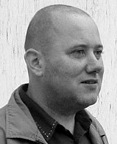Patrick O’Keeffe Gets “Carried Away”
I’m launching a new essay feature on Beatrice this week, in which short story writers will be invited to comment upon their favorite short stories or short story writers. It’s called “Selling Shorts,” which is an admittedly egregious pun, and probably a bit mercenary for a bookblog, but I hope it’ll come to grow on you—and the authors will be swell, at any rate.
First off, I’ve invited Patrick O’Keeffe, whose The Hill Road is [UPDATED: the winner] of the second annual Story Prize. He graciously agreed to contribute an essay about Alice Munro’s “Carried Away,” which can be found in the collection Open Secrets.
“Take what you have gathered from coincidence”—Bob Dylan
Alice Munro, in Open Secrets, resembles Tolstoy, in that she convincingly gives you the entire social structure of a place, in her case the town of Carstairs, from top to bottom, each character from the inside out. “Carried Away,” Louisa’s story, is constructed around a set of bizarre, though plausible, coincidences. Louisa is initially a commercial traveler; she later becomes the public librarian, and receives letters from Jack Agnew, a soldier in the First World War. She sends him a photograph, falls deliriously in love with him, but when he returns from the war, he marries the dull, conventional Grace. Louisa, unlike Grace, possesses “some consciousness of herself as a heroine of love’s tragedy.” Jack, however, was engaged to Grace before he went off to the war. He sneaks books out of the library, but never approaches Louisa, whose love for a man she has never seen persists. There is an indication of mythology, of legend, to all this.
Once an outsider and a stranger in the town, Louisa, as time passes, ends up doing well for herself, because she marries Arthur Doud. The Doud family owns the piano factory, which is the town’s chief employer. One afternoon, Arthur visits the library to return Jack Agnew’s books, given to him by Jack’s wife, Grace, after Jack is beheaded in an accident with a mechanical saw in Arthur’s factory. Louisa doesn’t tell Arthur about Jack, and a new episode in both of their lives begins.
It is often mentioned how marvelously Munro handles time, and “Carried Away” demonstrates this. William Trevor, when asked in a Paris Review interview if “time” is a “healer or a destroyer,” responds that it is “both.” All of Munro’s work has this feel to it; for example, there is a scene at the end of “Carried Away,” where Louisa, now elderly, with Arthur dead, believes she is talking with Jack. She “goes under a wave,” gets carried away, which the reader experiences, with intense feeling, through Louisa’s distorted consciousness. In reality, she is talking with Jim Frarey, who took her virginity years back, one night in the Commercial Hotel, during the flu epidemic. She and Frarey are tipsy then; she reveals her love for Jack, and wonders aloud, why, after returning from the war, did he not contact her. Frarey tells her that Jack probably got a little “carried away,” a condition he silently believes women are more inclined to.
Now, all these years later, he tells her that “love never dies.” Has Frarey carried a flame for her in the same way she does for Jack? Louisa ponders that “love dies all the time, or an any rate it becomes distracted, overlaid—it might as well be dead.” She has lived an interesting, even astonishing life, but perhaps it’s the life you didn’t live that causes the trouble. We learn too that she married Arthur to “get into a normal life,” suggesting that she gave up her foolish, romantic notions. The story fully embodies, with great emotional complexity, the realization Gurev arrives at, in “Lady With The Pet Dog”—that we live our “real, most interesting life under the cover of secrecy and under the cover of night.”
I have read “Carried Away” several times, and the details of the town and what happens to the people are more vivid and interesting to me than occurrences in my own real life (other stories and novels make me feel this way, too). George Steiner has described his experience reading the work of certain fiction writers: “The spontaneous coming together within themselves and language of that genesis of the living, that thing which walks in front of you so you forget the name of the author. That is genius, that is creativity….”
Enough said.
24 January 2006 | selling shorts |


 Our Endless and Proper Work is my new book with Belt Publishing about starting (and sticking to) a productive writing practice.
Our Endless and Proper Work is my new book with Belt Publishing about starting (and sticking to) a productive writing practice. 
